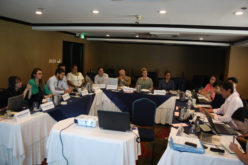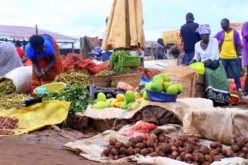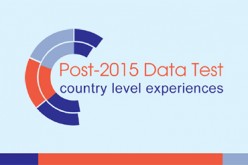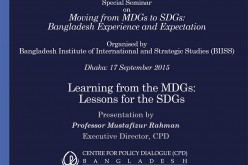Data issues have been critical in aligning SDGs at the country level
Cape Town International Convention Centre, 16 January 2017

Southern Voice on Post-MDG International Development Goals (Southern Voice) organised a panel discussion at the first-ever UN World Data Forum in Cape Town, where the network’s data experts unpacked initial country-experiences on data challenges for the implementation of Sustainable Development Goals (SDGs) and shared lessons learned from Southern Voice’s recently implemented data initiative, Post-2015 Data Test: Unpacking the Data Revolution at the Country Level (Post-2015 Data Test). Key findings from the Post-2015 Data Test project provided the background for a broader discussion around the practical implementation of the data revolution at the country level.
The panellists reviewed availability, accessibility, quality, relevance and coherence of data at the national level in their respective countries. The panellists were Mehmet Arda, Member, Centre for Economics and Foreign Policy Studies (EDAM) and Global Relations Forum (GIF), Turkey; Blandina Kilama, Senior Researcher, REPOA, Tanzania; Andrea Ordóñez, Research Coordinator, Southern Voice, Ecuador; and Maam Suwadu Sakho-Jimbira, Researcher, Initiative Prospective Agricole et Rurale (IPAR), Senegal.
The session was moderated by Debapriya Bhattacharya, Chair, Southern Voice and Distinguished Fellow, Centre for Policy Dialogue (CPD), Bangladesh. Molla Hunegnaw Asmare, Statistician, United Nations Economic Commissions for Africa (ECA) mentioned that ECA is putting in place a digital pathway towards policy formulation for the SDGs. Among other issues, he highlighted how digital technology is facilitating financial inclusion in Africa. His comments were followed by interactive exchanges with the participants of the session.
Key issues discussed at the session include the following:
- Unofficial data-producers could significantly complement the efforts of national statistical offices (NSOs). Moreover, proxy data and administrative data should be harnessed.
- In the Global South, the following scenarios on development data can usually be found: no data, bad data and better data. In this context, bad data is better than no data. In other words, we must take stock of and harness existing data.
- To “leave no one behind”, we need to pay greater attention towards vulnerable groups, which in turn, needs data to monitor these groups. Country-level statistics only show aggregate improvements, and do not represent the slower progress/lack of progress for those who are left behind and/or are difficult to reach.
- There are consistent data challenges across countries from different income groups in the areas of environment, governance and global partnerships.
- There are significant lags in the frequency of data collection on economic and social welfare using major statistical instruments. Concepts and methodologies lack consistency across instruments, impeding the comparability of data sources. Moreover, accessibility of the national statistics also remains an issue.
- There is an overlapping bias in the economic and social dimensions of sustainable development in the current activities of SDG implementation at the national level. First, these sectors are more likely to be prioritised in the national plans over issues of the environment and governance. Second, this bias is reiterated in the availability of data and the initiatives to collect data.
Acknowledging and working actively to overcome these persistent biases is at the core of what the data revolution should pursue. For this, the discussion of the data revolution must go hand in hand with debates on the implementation of coherent policies and financing to achieve the SDGs.
1,749 total views, 3 views today








